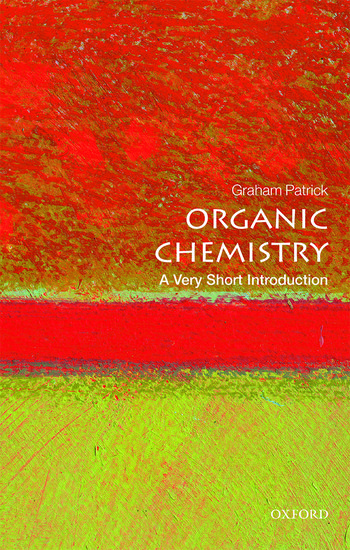Home >
A Very Short Introduction >
Organic Chemistry (Science)
A Very Short Introduction | Science
Organic Chemistry
ISBN: 9780198759775
Series: A Very Short Introduction
Organic Chemistry (Science)
A Very Short Introduction Organic Chemistry (Science) Media > Books > Non-Fiction > Education Books Expect Delays of Up to 4 Weeks| Order Below |
ISBN
9780198759775 (10-digit ISBN: 0198759770)
- Description
- Key Features
- Series Description
- Table of Contents
- Explains the key structures and properties of organic compounds, and the importance of organic chemistry to industry, in pharmaceuticals, polymers, petrochemicals, paints, food, and clothing
- Discusses the fundamental role of organic molecules to all life, in the form of proteins, nucleic acids, carbohydrates, and lipids
- Explores new materials like graphene and the challenges of synthesizing novel organic compounds
- Introduces cutting edge and future applications of organic chemistry in areas like nanotechnology
Organic chemistry is the chemistry of compounds of carbon. The ability of carbon to link together to form long chain molecules and ring compounds as well as bonding with many other elements has led to a vast array of organic compounds. These compounds are central to life, forming the basis for organic molecules such as nucleic acids, proteins, carbohydrates, and lipids. In this Very Short Introduction Graham Patrick covers the whole range of organic compounds and their roles. Beginning with the structures and properties of the basic groups of organic compounds, he goes on to consider organic compounds in the areas of pharmaceuticals, polymers, food and drink, petrochemicals, and nanotechnology. He looks at how new materials, in particular the single layer form of carbon called graphene, are opening up exciting new possibilities for applications, and discusses the particular challenges of working with carbon compounds, many of which are colourless. Patrick also discusses techniques used in the field.
Oxford's Very Short Introductions series offers concise and original introductions to a wide range of subjects--from Islam to Sociology, Politics to Classics, Literary Theory to History, and Archaeology to the Bible.
Not simply a textbook of definitions, each volume in this series provides trenchant and provocative--yet always balanced and complete--discussions of the central issues in a given discipline or field. Every Very Short Introduction gives a readable evolution of the subject in question, demonstrating how the subject has developed and how it has influenced society. Eventually, the series will encompass every major academic discipline, offering all students an accessible and abundant reference library.
Whatever the area of study that one deems important or appealing, whatever the topic that fascinates the general reader, the Very Short Introductions series has a handy and affordable guide that will likely prove indispensable.
Please note: As this series is not ELT material, these titles are not subject to discount.
1: Introduction
2: The fundamentals
3: The synthesis and analysis of organic compounds
4: The chemistry of life
5: Pharmaceuticals and medicinal chemistry
6: Pesticides
7: The chemistry of the senses
8: Polymers, plastics and textiles
9: Nanochemistry
References
Further Reading
Index
Organic chemistry is the chemistry of compounds of carbon. The ability of carbon to link together to form long chain molecules and ring compounds as well as bonding with many other elements has led to a vast array of organic compounds. These compounds are central to life, forming the basis for organic molecules such as nucleic acids, proteins, carbohydrates, and lipids. In this Very Short Introduction Graham Patrick covers the whole range of organic compounds and their roles. Beginning with the structures and properties of the basic groups of organic compounds, he goes on to consider organic compounds in the areas of pharmaceuticals, polymers, food and drink, petrochemicals, and nanotechnology. He looks at how new materials, in particular the single layer form of carbon called graphene, are opening up exciting new possibilities for applications, and discusses the particular challenges of working with carbon compounds, many of which are colourless. Patrick also discusses techniques used in the field.
Key Features
- Explains the key structures and properties of organic compounds, and the importance of organic chemistry to industry, in pharmaceuticals, polymers, petrochemicals, paints, food, and clothing
- Discusses the fundamental role of organic molecules to all life, in the form of proteins, nucleic acids, carbohydrates, and lipids
- Explores new materials like graphene and the challenges of synthesizing novel organic compounds
- Introduces cutting edge and future applications of organic chemistry in areas like nanotechnology
Series Description
Oxford's Very Short Introductions series offers concise and original introductions to a wide range of subjects--from Islam to Sociology, Politics to Classics, Literary Theory to History, and Archaeology to the Bible.
Not simply a textbook of definitions, each volume in this series provides trenchant and provocative--yet always balanced and complete--discussions of the central issues in a given discipline or field. Every Very Short Introduction gives a readable evolution of the subject in question, demonstrating how the subject has developed and how it has influenced society. Eventually, the series will encompass every major academic discipline, offering all students an accessible and abundant reference library.
Whatever the area of study that one deems important or appealing, whatever the topic that fascinates the general reader, the Very Short Introductions series has a handy and affordable guide that will likely prove indispensable.
Please note: As this series is not ELT material, these titles are not subject to discount.
EASY ORDER FORM
PRICES LISTED INCLUDE CONSUMPTION TAX
Price Before Tax:
¥1,790


